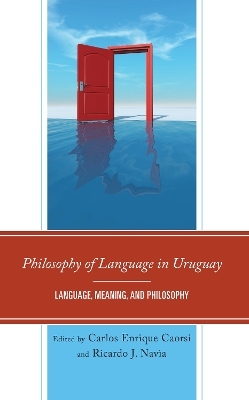
Philosophy of Language in Uruguay
Language, Meaning, and Philosophy
Seiten
2024
Lexington Books/Fortress Academic (Verlag)
978-1-6669-6034-1 (ISBN)
Lexington Books/Fortress Academic (Verlag)
978-1-6669-6034-1 (ISBN)
Philosophy of Language in Uruguay examines works of philosophy of language through epistemology, linguistics, and cognitive sciences to discover how philosophy of language has developed in Uruguay in the last two decades.
In Europe, and later in the United States, the revitalization of the philosophy of language emerged from the need to address certain perplexities concerning formal disciplines and to work out certain complexities found within philosophy. In Uruguay, however, philosophy of language became limited to a meta-theory about the basic concepts of language. Edited by Carlos Enrique Caorsi and Ricardo J. Navia, Philosophy of Language in Uruguay: Language, Meaning, and Philosophy presents an anthology of works discussing the different directions in which philosophy of language has developed in Uruguay in the last twenty years. The present compendium gives a fairly comprehensive and representative picture of how philosophical approaches from a linguistic perspective have developed in this Latin American country. Uruguayan philosophy has a very small international presence, but includes works worthy of being better known within the philosophical explorations of language as early as the 1900s. The contributors dissect these explorations through epistemology, linguistics, and argumentation and cognitive sciences to discover how philosophers of language such as Carlos Vaz Ferreira have grown to understand the complexities of language and how it has affected us today.
In Europe, and later in the United States, the revitalization of the philosophy of language emerged from the need to address certain perplexities concerning formal disciplines and to work out certain complexities found within philosophy. In Uruguay, however, philosophy of language became limited to a meta-theory about the basic concepts of language. Edited by Carlos Enrique Caorsi and Ricardo J. Navia, Philosophy of Language in Uruguay: Language, Meaning, and Philosophy presents an anthology of works discussing the different directions in which philosophy of language has developed in Uruguay in the last twenty years. The present compendium gives a fairly comprehensive and representative picture of how philosophical approaches from a linguistic perspective have developed in this Latin American country. Uruguayan philosophy has a very small international presence, but includes works worthy of being better known within the philosophical explorations of language as early as the 1900s. The contributors dissect these explorations through epistemology, linguistics, and argumentation and cognitive sciences to discover how philosophers of language such as Carlos Vaz Ferreira have grown to understand the complexities of language and how it has affected us today.
Carlos Enrique Caorsi is full professor of contemporary philosophy in the School of Humanities and Education Sciences at the University of the Republic of Uruguay. Ricardo J. Navia full professor in the Philosophy Department at the University of the Republic of Uruguay.
| Erscheinungsdatum | 25.04.2024 |
|---|---|
| Reihe/Serie | Philosophy of Language: Connections and Perspectives |
| Co-Autor | Robert Calabria Díaz, Carlos Enrique Caorsi, Ignacio Cervieri |
| Sprache | englisch |
| Maße | 161 x 236 mm |
| Gewicht | 531 g |
| Themenwelt | Geisteswissenschaften ► Philosophie ► Erkenntnistheorie / Wissenschaftstheorie |
| Geisteswissenschaften ► Philosophie ► Sprachphilosophie | |
| Geisteswissenschaften ► Sprach- / Literaturwissenschaft ► Sprachwissenschaft | |
| ISBN-10 | 1-6669-6034-9 / 1666960349 |
| ISBN-13 | 978-1-6669-6034-1 / 9781666960341 |
| Zustand | Neuware |
| Haben Sie eine Frage zum Produkt? |
Mehr entdecken
aus dem Bereich
aus dem Bereich
die Grundlegung der modernen Philosophie
Buch | Softcover (2023)
C.H.Beck (Verlag)
18,00 €
Buch | Softcover (2023)
Reclam, Philipp (Verlag)
7,00 €


![Was heißt Denken?. Vorlesung Wintersemester 1951/52. [Was bedeutet das alles?] - Martin Heidegger](/media/113619842)